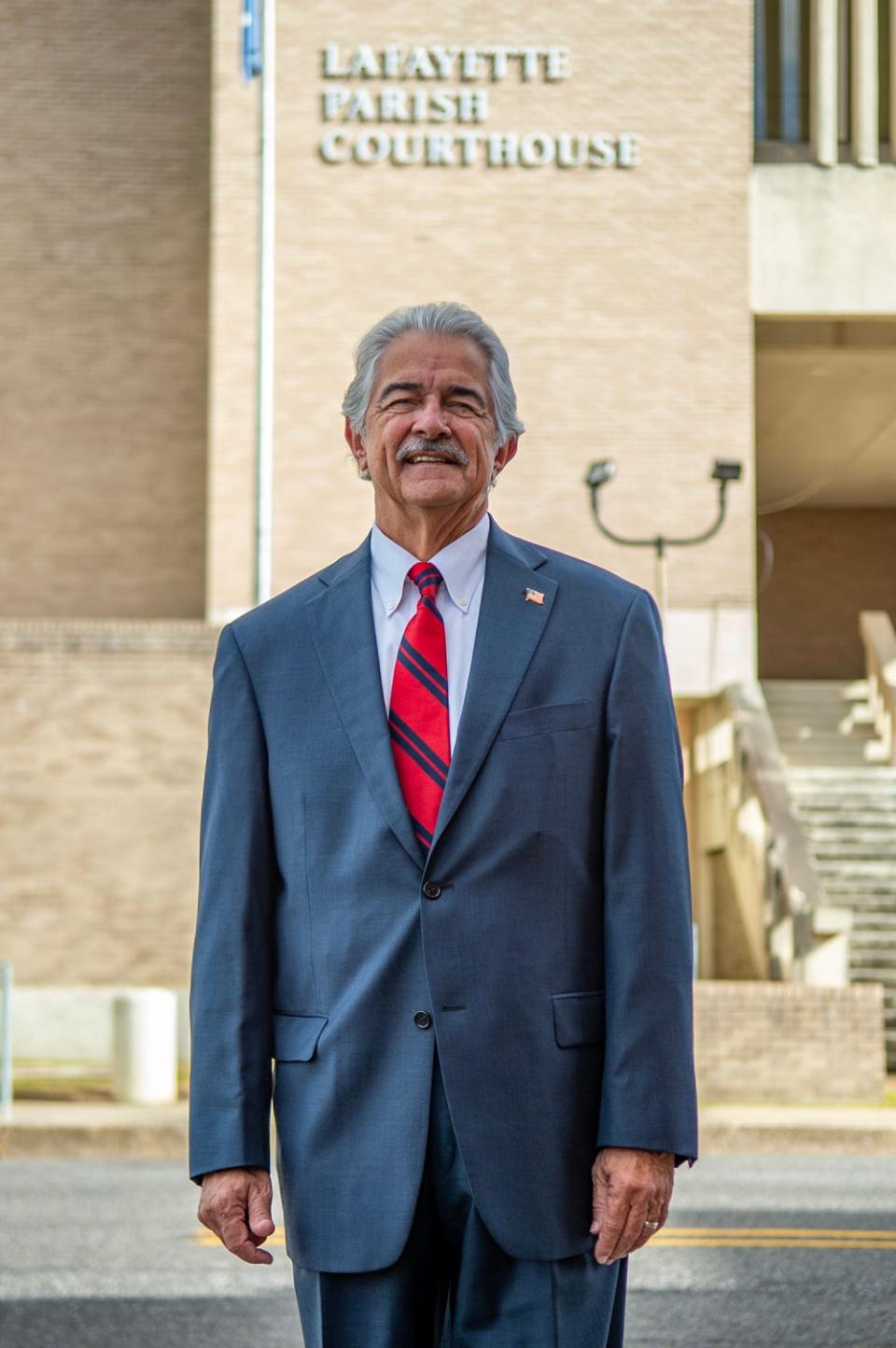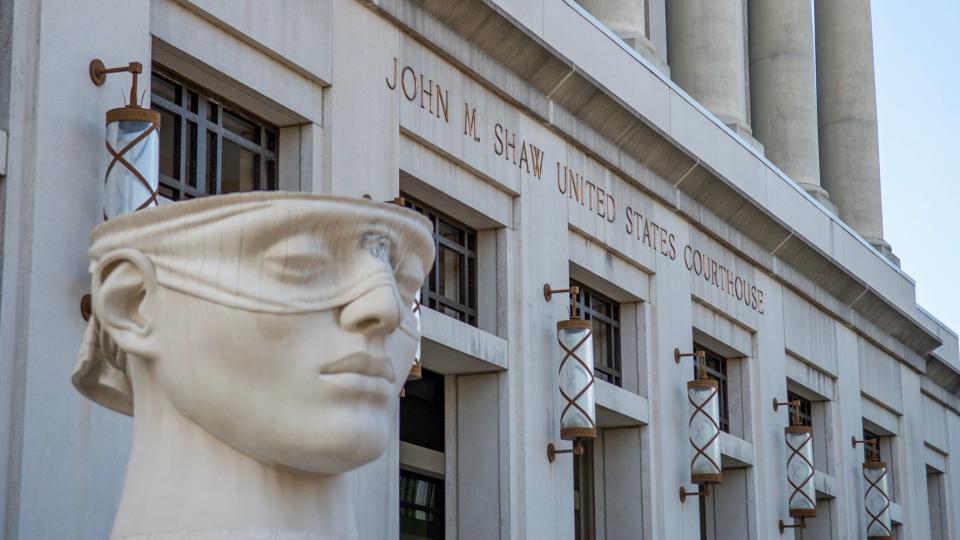What we know and what we don’t about the Lafayette courthouse raid five months later
Five months after federal investigators raided the Lafayette Parish Courthouse in May, little has been revealed about the probe into District Attorney Don Landry’s office.
But the last federal investigation that led to a search of the District Attorney’s office in Lafayette may shed some light on the work being done behind closed doors in the FBI’s latest inquiry.
A day after the May 9, 2022, raid, Landry announced that federal agents had executed a search warrant for records related to his office’s pretrial intervention program.
Landry then suspended Assistant District Attorney Gary J. Haynes and suspended his office’s contract with pretrial services coordinator Dusty Guidry, who was arrested on narcotics charges in December.
The Daily Advertiser learned this week that on May 10 Landry’s staff sought help to reset the passwords of Gary Haynes’ and Guidry’s devices to gain access to their data, according to a source with knowledge of the situation, potentially connecting the pair to the latest federal investigation.
CONSIDER SUBSCRIBING TODAY: Help support local journalists like Andrew Capps
Landry declined to comment on the matter, citing the federal probe, and said his office was not able to release a copy of the search warrant served by federal agents for the May 9 raid.
Gary Haynes, whose wife Barna Haynes was one of six people who pleaded guilty in the 2012 federal investigation into the DA’s office, was also suspended from his work as a Lafayette city prosecutor after the May 9 raid.
Guidry was arrested on Dec. 10 by St. Martin Parish Sheriff’s deputies on charges of drug possession and transactions involving drug offenses. His booking report shows deputies seized nearly $4,100 during his arrest, but does not include where he was arrested or any narrative other than “narcotics investigation.”
Guidry’s charges are still pending and he has not yet been brought before a judge to enter a plea.

Federal officials have not publicly identified any suspects related to the May search at the courthouse. FBI policy is to neither confirm, nor deny, the existence of any investigation.
Federal prosecutors took nearly a year to file charges against the six people later convicted in the 2012 investigation into the DA’s office. Five of those suspects were only identified after they signed plea deals, which came within days of their charges being filed in 2013.
Investigators dubbed private investigator Robert Williamson, who styled himself as the “Secret Cajun Man,” the mastermind of a plan that saw employees at the DA’s office take cash bribes in exchange for quick and easy resolutions to drunk driving charges through a since-defunct pretrial intervention program.
Williamson, who died in December according to court records, pleaded guilty to multiple federal charges in 2015 and was sentenced to six years in prison.
While little has been revealed about the latest federal probe of the DA’s office, the history of the prior investigation suggests this year’s courthouse raid was long in the making.
Similarly rare wiretaps
In September 2011, five months before the Feb. 27, 2012 courthouse raid, federal agents began a six-month wiretapping operation of Robert Williamson’s cell phone.
The unusually long wiretap was authorized by a federal judge for an investigation into fraud, which has been a rare justification for phone surveillance in the Western District Court of Louisiana.
The vast majority of wiretap approvals in the Western District Court, which includes Lafayette, last for just 30 days and are focused almost exclusively on narcotics investigations.
A similarly rare wiretap also preceded the courthouse raid this past May, as a federal judge in Lafayette authorized four months of surveillance on an undisclosed cell phone in August 2021, for a racketeering investigation, another seldom-used justification.
That same day, the same judge authorized another wiretap for a narcotics investigation which similarly ended after four months.
Records of federal wiretapping activities are tightly sealed from public view, suggesting the identity of the wiretap operations’ targets may never be publicly disclosed. The recordings obtained by the wiretap on Robert Williamson’s phone, for example, were revealed only to his attorneys and only on the day he entered a plea deal.
General information about wiretaps is not reported to Congress by federal judges until six to 18 months after they are concluded, making it unclear whether federal agents are currently using wiretap operations for their investigation.
Bump in federal activity
The Lafayette area has also seen a relative bump in federal activity since the courthouse raid in May, most notably in August when a Department of Justice plane flew into Lafayette twice in one week.
This week saw another influx of federal activity, as two DOJ plans landed in Lake Charles Monday morning, including a smaller jet typically reserved for top officials that flew back to the DC area after just three hours.
There is no record yet of the other plane, a much larger Boeing 757, having departed Lake Charles.

Vicki Chance, a spokesperson for the U.S. Attorney’s Office for the Western District of Louisiana - part of the DOJ - declined to comment on the flights Friday.
The timing raises questions about whether investigators have empaneled a grand jury, which would determine whether enough probable cause exists to file charges against a suspect.
Grand jury proceedings are led by federal prosecutors and are not overseen by judges. They can be convened anywhere within a federal district court’s jurisdiction, meaning charges against a suspect in Lafayette could be approved by a grand jury anywhere in western Louisiana.
Federal prosecutors empaneled a grand jury following the 2012 courthouse search to review their case for levying charges against Williamson.
Former District Attorney Mike Harson, who was not charged in the 2012 investigation, was chastised during a July 2012 interview by federal agents for allowing Barna Haynes to compile his office’s response to that grand jury’s subpoena for OWI records.
News reports show federal agents began sending “target letters” to suspects in the prior investigation as part of grand jury proceedings in October 2012, roughly eight months after the courthouse search.
Federal grand jury information is tightly controlled, as federal law prohibits almost all participants from revealing even the existence of a grand jury to avoid tipping off suspects.
This article originally appeared on Lafayette Daily Advertiser: What we do and don't know about Lafayette courthouse FBI raid in May

